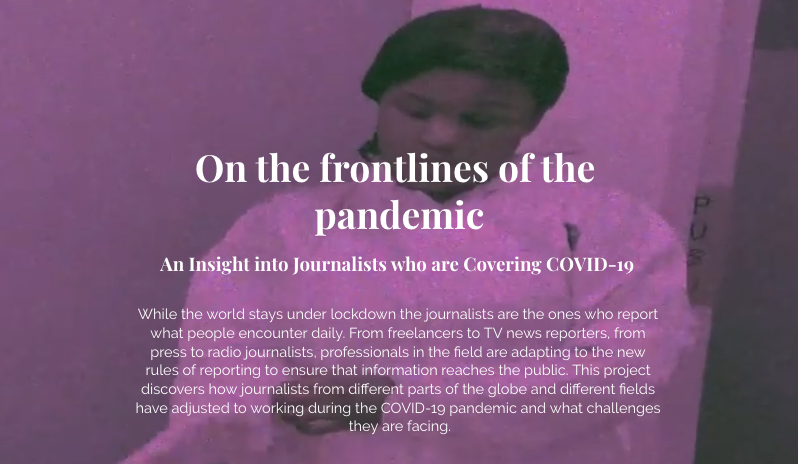The hidden impact of reporting on covid-19 from the frontline
From fragile mental health to separated families, eight international journalists open up about their work and life while reporting on the deadly pandemic


From fragile mental health to separated families, eight international journalists open up about their work and life while reporting on the deadly pandemic

This article was migrated from an old version of our website in 2025. As a result, it might have some low-quality images or non-functioning links - if there's any issues you'd like to see fixed, get in touch with us at info@journalism.co.uk.
Giedre Peseckyte is a multimedia journalist and author of the online project On the frontlines of the pandemic.
For the past six months, journalists have been on the frontline of reporting on the covid-19 pandemic. They had to quickly adapt to new rules, safety protocols, lockdown measures or travel bans. Some had to transform their homes and did all the reporting without stepping outside. Others added personal protective equipment (PPE) and sanitisers to their journalistic arsenal and went to the field.
What was happening in the journalists’ heads when they were working on stories from all over the world? How much was left unseen and how did the covid-19 situation influence their reporting and their work in general?
I reached out to eight journalists from different continents to find out.

"Sometimes I feel I am in a movie and we are fighting against an invisible enemy and that is everywhere," says Mohammad Rakibul Hasan, a photojournalist, documentary filmmaker, and visual artist from Bangladesh. He had to take serious precautions to ensure the safety of himself, his sources and his family.
His three children were sent to stay with grandparents: "My oldest kid is my seven-year-old daughter, she knows that her father is a journalist. One day she should be proud that her dad was in the front line covering this issue for mankind." When the virus has reached Bangladesh Hasan focused his reporting on underprivileged people living in Dhaka’s slums with the photo project Last savings.
Temilade Adelaja, a photojournalist from Nigeria working for Reuters, looked at underprivileged communities as well: "A lot of people lost their jobs in this period. I really want to know how they are coping with this and how are they planning to survive."
Although Nigeria managed well the 2014 Ebola outbreak, Adelaja said that this time she was more worried. "You think the Ebola virus was scary. We tackled it as soon as it came. With coronavirus, the numbers of cases are going up every day. That is scary."
On 20 January 2020, Beimeng Fu, a freelance video journalist from China was interviewing people on train stations in Beijing and Shanghai. It turned out that back then people were not scared of the virus. "Only one out of ten people said that it is concerning. But all the others, younger and older, thought that it is going to be okay," says Fu.
Two months later, Fu went to Wuhan on an assignment carrying a bag full of protective gear. Despite the danger posed by the virus, she said that government harassment of journalists in China was more concerning than covid-19.
Lucina Melesio, a freelance multimedia journalist from Mexico, decided to report from the field instead of placing phone calls. "In some international outlets, it was said that Mexico is full of dead bodies and that the government was hiding numbers. It didn't really seem true," says Melesio.
She wanted to see the situation with her own eyes and inform Mexicans on what was going on in hospitals. "Three days later I started crying out of nowhere. When I'm alone with myself then I get a chance to feel," says Melesio about her experience of working during the pandemic.
Phone calls and the internet were the key elements for Amadou Diallo’s reporting. "That obviously has some downsides because it is always great when you can talk to people face to face. It has some upsides in the sense that if you have someone’s home number for sure they gonna be there," says Diallo, the solutions journalist on education from the USA.
Jen Stout, a producer on BBC Scotland's news programme The Nine together with her team found a way how to lighten up hard news.
The programme ends with two-minute videos made of user-generated footage. "It is a really nice little uplifting glimpse into the life that you would never normally see. We try to make it varied, so it is not only more death, more bad news," says Stout.
Sara Milchner Funseth is a TV news reporter in Sweden who has not stopped reporting from the field. She did take precautions though: working with boom microphones, keeping two meters distance and interviewing outside are only some of the safety measures she implemented.
"I feel that I do something important because people really need to know what is happening. Of course, every day so many people die, it is quite hard," says Funseth.
Juta Liutkeviciute, a radio journalist from Lithuania can be sometimes found in her wardrobe where she records her weekly radio show. Since the quarantine started, Juta has turned her flat into a radio studio. When phoning her guests, she asks: "How are you doing during the quarantine? We cannot pretend that we live in a different reality."
Click here to see the full multimedia project On the frontlines of the pandemic.
Do you want to become a successful freelancer? Learn new skills and get a certificate in freelance feature writing, pitching, copywriting, sub-editing and more. Click here for more information